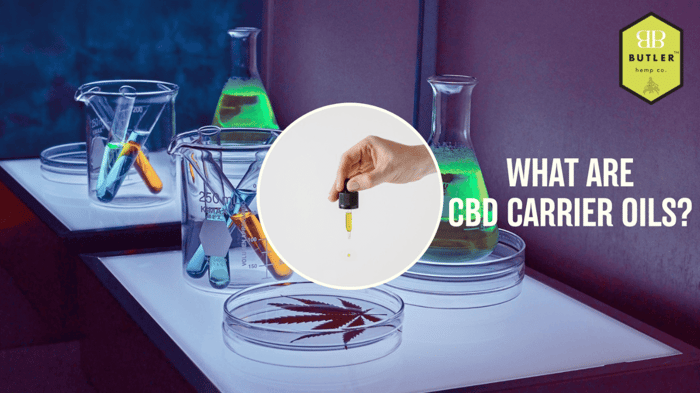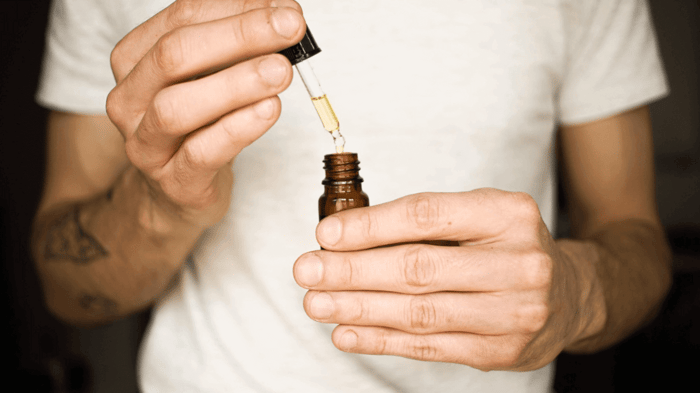10/27/2022
If you’re relatively new to the world of CBD, you may have heard the term “carrier oils” and wondered what it meant. And if you’ve spent any time shopping for CBD products, chances are you’ve encountered at least a handful of different carrier oil options already.
That’s because every different kind of oil has varying properties, from taste and texture to shelf stability and more. Therefore, every company that creates CBD products has a series of decisions to make about which carrier oil would be best for their product line, and every consumer faces similar decisions when it comes to choosing the best product for their needs.
Let’s first clarify the concept of carrier oil, and then explore the differences between some of the top CBD carrier oil options.
What You Need To Know About CBD Carrier Oils
What are carrier oils, and what purpose do they serve?
Pick up any bottle of moisturizing lotion or jar of peanut butter in your house and read the label. In all likelihood, you’ll see at least one — if not multiple — oils listed under the ingredients section that seem like they have little if anything to do with the product itself.
Why does your peanut butter contain palm oil when peanuts are already oily? And why does your moisturizing skin cream have avocado oil when you’re clearly not an avocado?
It’s because mixing essential ingredients with additional oils, known as carrier oils, serves a number of purposes. Carrier oils are used to:
- • Dilute intense ingredients to a safely usable level
- • Keep ingredients evenly emulsified so components do not separate during storage
- • Increase the stability and shelf life of products to delay spoilage
- • Change the scent or flavor of a product
- • Add additional benefits beyond the main ingredients’ purposes
The palm oil prevents your peanut butter from separating into two distinct layers of dense peanut paste with an oil slick on top, and the avocado oil boosts your skin cream’s moisturizing capabilities while giving the lotion a pleasant texture and aroma.
In the CBD world, manufacturers add carrier oils for all the reasons listed above. If you’ve checked the label on CBD tinctures from different companies, you’ve probably come across hemp seed oil, vegetable glycerin, and MCT or coconut oil most frequently. When blended with CBD, these carrier oils tend to result in the most favorable formulas for dosage safety, long-term storage, and other benefits.
What is the best carrier oil for CBD?
Though hemp seed oil, vegetable glycerin, and MCT oil are the three most popular carrier oils for CBD tinctures, Butler Hemp Co. has chosen to use only coconut-based MCT oil in our products.
We’ve found that MCT carrier oils function optimally for a number of reasons.
Suspension
Perhaps the most important function of a carrier oil in a CBD product is to achieve and maintain an even suspension.
When you draw up an exact dose in a dropper, it’s because you want to be certain you’re putting that specific amount of CBD into your body. What you don’t want is to use a CBD product with a carrier oil that hasn’t stayed in suspension, because even the most carefully measured droppers could contain proportionally more or less CBD than you intended.
In our experience, it’s best to blend CBD oil with coconut oil for an evenly dispersed and stable suspension that results in an exact dose every time.
Bioavailability
Studies have shown that anything ingested alongside medium chain triglycerides — which are the “MCT” in MCT oil — absorbs more efficiently into the body. This increased bioavailability means it’s easier for your body to absorb and use the CBD you take.
Taste and Digestion
Coconut oil is virtually tasteless after refinement. Even if some tropical notes linger, most people would strongly prefer to use coconut oil for a sublingual dose of CBD rather than try to hold hemp seed oil or vegetable glycerin in their mouths. When it comes to taste, there’s simply no comparison.
Both coconut oil and hemp seed oil are superior to vegetable glycerin in terms of digestion. Vegetable glycerin can have a laxative effect on some people and may cause other unpleasant digestive problems as well. Especially if you’re using CBD to help you sleep, you’ll want to avoid anything that might upset your stomach and force you to get up multiple times during the night.
Health Benefits
Coconut oil is high in Omega fatty acids, which have many benefits for your brain and body. It’s high in antioxidants and may help to raise HDL, also known as “good” cholesterol. We’ve selected coconut oil as the healthiest option among the top CBD carrier oils because it imparts these benefits on top of what you’re getting from the CBD itself.
Storage Stability
Of the three most common carrier oils used for CBD tinctures, coconut oil is the most shelf stable and easy to store. It will resist spoilage even if you purchase a tincture and then let it sit in your cupboard for a while.
This is an especially important consideration for people who use CBD occasionally but not every day, because they won’t have to throw out a spoiled product and buy more only for the same thing to happen again.
For the sake of comparison, coconut oil should be shelf stable for 18 months at a minimum, whereas vegetable glycerin starts to destabilize after a year and hemp seed oil will likely spoil within one year.
Keep your individual needs in mind as you shop.
Though we feel strongly that coconut oil is the best choice for CBD tinctures, your priorities may differ from ours.
Vegetable glycerin can often be produced more cheaply than coconut oil, especially when it comes from the less expensive soybean plant. If price is your top consideration, you may want to keep this in mind.
Additionally, some people are allergic to coconut and should steer clear of coconut and MCT oil products. In that case, choosing a tincture made with hemp seed oil could provide some health benefits — hemp seed oil contains each of the nine essential amino acids — without the allergy risk.
The origin of your carrier oil might be just as important as the oil itself.
Let’s say you’ve decided that coconut oil is your carrier oil of choice. Unfortunately, not all coconut oil CBD blends are created equally.
Especially in recent years, due to shipping concerns, obtaining high-quality coconut oil has become more difficult. Some companies have turned to sources whose harvesting methods threaten the environment or who use less-than-stellar work practices, while others may feel forced to skimp on the refinement process.
Butler Hemp Co. sources only the best MCT oil for our tinctures.
We purchase all of our carrier oil from a Certified Goods Manufacturing Practices (CGMP) lab in the United States. Our source is committed to producing only cruelty-free and environmentally friendly coconut oils harvested in a sustainable manner.
Additionally, we use thorough third-party testing to ensure that every product is up to our high standards before it ever hits your doorstep. Whether you choose the Full Spectrum Sleep Blend for nighttime relaxation or a daytime, work-friendly product like this one, you’ll be making a conscious decision to support your own wellbeing along with the environment.




